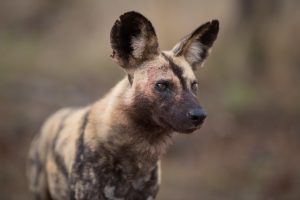Course Info
A certificate for anyone in the Field Guiding Industry, Wildlife conservation or individuals who are interested in learning more about the fascinating African Wild Dog.
This course will enable you to understand the more subtle aspects of African Wild Dog behaviour and appreciate some of the reasons why this incredibly social carnivore has been so heavily persecuted over the last century. The knowledge gained can greatly enhance your understanding and pleasure when viewing this species in the wild.
Certificates are awarded on the successful completion of the course.

There are 2 options for this course:
1. The standard twelve-month course with a pre-set release date for each unit and assignment due dates.
2. Do It In Your Own Time (DIIYOT) which has no pre-set assignment dates, new units are released when your assignment for the previous one is received. The maximum time allowed for completion is 24 months.
Students can enrol at any time for either the Standard or the DIIYOT course.

Important information
- This course is online and requires you to be computer literate.
- To successfully do this course you must have access to Microsoft Word.
- Please note that your course notes are included in the course fee, however any prescribed books need to be purchased and paid for on top of this.
What the student will learn
- About the habitat and evolution of the African Wild Dog, his social and hunting behaviours.
- The student will also learn about the problems facing the African Wild Dog and the conservation efforts being made to preserve this iconic African species.
Course Content
- Unit 1
-
- Evolution of canids and the African Wild Dog.
- Geological timescale.
- Morphology.
- Unit 2
-
- Social behaviour
- Pack structure.
- Reproductive behaviour.
- Differences in a large and small canid pack.
- Unit 3
-
Hunting:
- Benefits of cooperative hunting.
- Pre hunt behaviour.
- Feeding hierarchy.
- Diet.
- Communication.
- Man’s attitude to Wild Dog hunting.
- Unit 4
-
- Status, population and distribution of the Wild Dog.
- Reasons for decline of the African Wild Dog.
- Practices in Wild Dog Conservation.
- Unit 5
-
- Conservation.
- Monitoring populations.
- Unit 6
-
- This final unit is a study by the student about reintroducing African Wild Dogs to a Reserve of the student’s choice.


